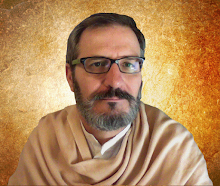To meditate while working is
one of the three feet of the Agya (the whole of the three practices
of the original-yoga). There is a technique to do it. It is obviously
easier being watchmaker than sale representative but it is possible!
Summary:
The nonaction is a very difficult concept to understand, even for those who practise it and believe to have understood. Nonaction is a usual concept for the Zen and on the path of Freedom, in the practice of its original-yoga it is represented by one of the three feet of the Agya (the whole of the three practices): Duty.
The nonaction is a very difficult concept to understand, even for those who practise it and believe to have understood. Nonaction is a usual concept for the Zen and on the path of Freedom, in the practice of its original-yoga it is represented by one of the three feet of the Agya (the whole of the three practices): Duty.
Nonaction is not to do nothing.
Theoretically nonaction is doing while being released of the merits,
of the results of one’s acts, in the detachment. In the practice of
the original-yoga it is more practical than that: nonaction (or Duty)
is to make while keeping a part of the own attention on the technique
of Meditation known as “of-the-Holy-Name”. This technique of
Meditation (one of the four revealed) can be practised formally,
sitted or more slightly while acting.
The Nonaction
By reading this sentence of
Lao-Tse we could believe that this Chinese Master recommended to do
nothing, to stay there, at the best in Satori, the contemplation, in
the worst case sleeping… but Nonaction it is not to do nothing.
“What is the nonaction”?
This by Lao-Tse and the Tao beloved concept [that is also present in
the Bhagavad-Gîtâ], is not the equivalent of the passivity, the
inertia nor the lazes. It is exactly the opposite which has to be
seen here, i.e. inactivity of the passions and the material desires
which are in contradiction with the natural law”. [Wikipedia].
At the same time as this nonaction, Lao-Tse recommends the activity
in the movement, i.e. in the natural impulse proceeding of Tao:
as go the
floods to the sea, as the trees flower,
with the simple beauty of
Tao.”
[Lao-Tse]
To say Tao we say One and
Ananda. The Christ said my Father and the Kingdom. To name the
Nonaction we use the word Duty which is the active-Meditation. Others
would have used karma-yoga and in the Cistercian monks (for example)
work has a great importance if it is made by keeping the spirit in
prayer.
which constitute the base of our Sadhàna,
the Agya,
covering the day, of the waking up to the sleeping.
[Bhaktimàrga 2-3-2]
We gave a name to the Peace of
the center of us: Holy-Name. Others use other names according to
their culture and their language. It is possible to say Verb, also,
or Te, the one of the Tao-Te-King or Holy Spirit, Holy Ghost, Satnam,
etc
The Holy-Name is not a theory.
We can live inside us when we know what it is, where to find it and
how to do. It is the purpose of our practice.
Everyone, without exception,
knows this Holy-Name, it is normal: it is inside everybody and
without him we would not live. But you do not know what it looks like
and it is the reason why we do not identify it as such when our
Conscience, our mood makes that we feel it. We say then:
satisfaction, wellness, Peace, calm, serenity, love, cool! It is,
each time, the Holy-Name, this “inner-smile”.
The path is a way of life
The path is a way of life where
we go to deepen our Conscience. To that end, there is the Duty, you
know, this Nonaction which is not doing nothing ! The Duty
consists in practising a technique of particular Meditation, while
doing what we have to do normally. This technique of Meditation
cannot be seen from outside and it doesn’t hinder us to act, quite
to the contrary: it enables us to be intenter on doing our
activities.
in the Holy-Name.
It is what Lao-Tse named
nonaction.
The monks who work while praying have the same intention.
Thus we can meditate by doing the dishes !
''Continuing this
Meditation in the actions
Helps to stabilize this
Peace''
[treatise 1-35]









